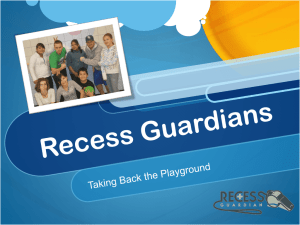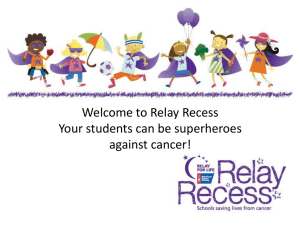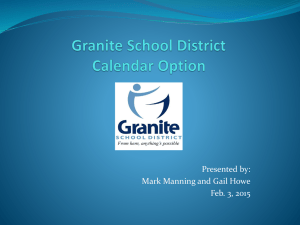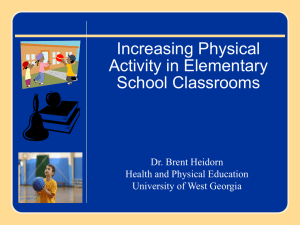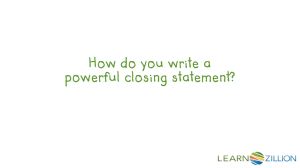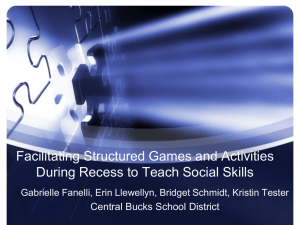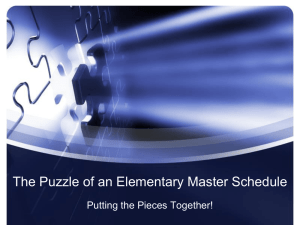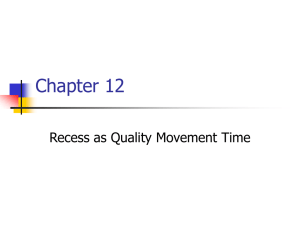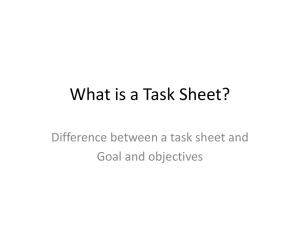Sorry Kids, No Recess This Year!
advertisement
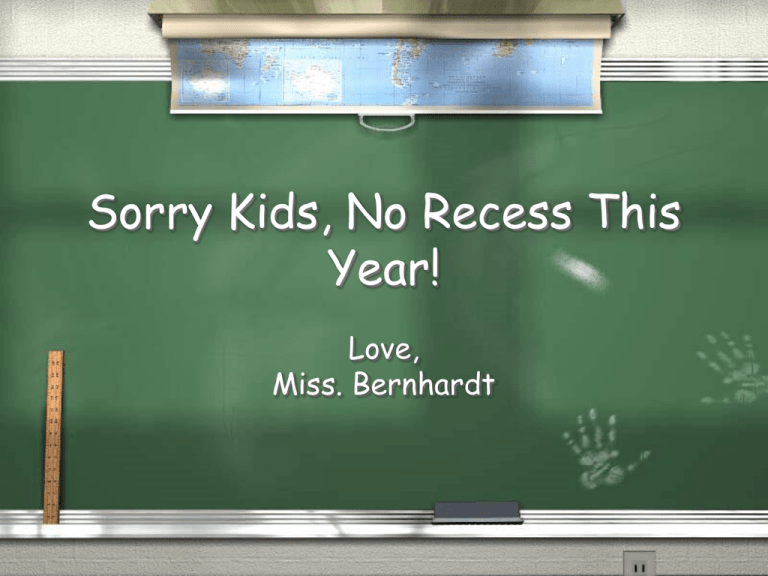
Sorry Kids, No Recess This Year! Love, Miss. Bernhardt Here we go… “… A number of dissident child psychologists warn that most pediatricians and family physicians are not qualified to distinguish between an abnormal child and a child who is exhibiting quite normal behavior in not wanting to sit through a seven-hour school day cramming for standardized tests--- without recess, art, music, gym… Here we go… why not increase the number of children taking Ritalin to 7.5 million so we could increase classroom size to 45 and save a lot of money.” -Ohanian, 2002 My inspiration “Johnny, this is your last warning,” the teacher says annoyingly to Johnny for the 3rd time in the past 30 minutes… “Congratulations, you just lost 5 minutes of your recess, Johnny,” the teacher says as she scribbles Johnny’s name on the board. “And don’t make me add more time to it!” Kim Juan Johnny High Expectations vs. Too High of Expectations Expect better behavior from kids than we do from adults. Children are NOT little adults, they are CHILDREN! Goal of My Final Project Is there in fact, solid scientific evidence that supports that kids need recess? Outline of My Final Project What’s What So, all the hype? about the kids? what you gonna do about it? What’s all the hype? Think: How many recess periods did you have in elementary school? How long were they? What’s all the hype? 1989- 90% of schools had at least one recess per day (Jarrett, 2002) Today, 40% of schools are reducing, deleting or considering deleting recess (NAECS, 2001) Why is recess being reduced and deleted? Accountability Time would be better spent on other “academic” subjects “Recess disrupts work patterns” Safety and liability concerns Standardized testing Children’s behaviors on the play ground. What about the kids? Physical development Emotional Cognitive and social development development Classroom management Physical Development ObesityIncrease inactivity circulation and blood flow to the brain Reduce stress Improved mood Increases attentiveness Decrease restlessness Gross and fine motor skills Emotional and Social development Outlet for reducing anxiety Manage stressendorphins Gain self-confidence Peer interactionslatchkey kids Cooperation Sharing Language/ communication development Rule following Conflict resolution Cognitive development Improved concentration Improved rate of academic learning Improved recall w/ frequent breaks Better attentiveness Boosts brain cells in the hippocampus Learning on the playground Learning on the playground Authentic Natural experiences elements: wind, dirt, water, seasons Physics: see-saw, merry-go-round, swings Math and numbers: counting, keeping score Language development: explaining, describing, articulating, making use of oral language and vocabulary Classroom management Taking away recess is counter productive- fidgety and kids with ADD and ADHD Classroom management . “In allowing a mental change and release of energy, recess may facilitate subsequent attention to more academic tasks and minimize disruptive behavior once students return to the classroom; recess, therefore, becomes an important element of classroom management and behavior guidance” (NAECS, 2001). o So, what are you going to do about it? Sources Jarrett, O. (2002). Recess in Elementary School: What does the Research Say? Illinois: ERIC Clearinghouse on Elementary and Early Childhood Education. (ERIC Document Reproduction Service No. ED 466331) National Association of Early Childhood Specialists (NAECS) in State Departments of Education. (2001). Recess and the Importance of Play. A Position Statement on Young Children and Recess. U.S. Department of Education, 2-15. Ohanian, S. (2002). What Happened to Recess and Why are our Children Struggling in Kindergarten? New York: McGraw-Hill.
